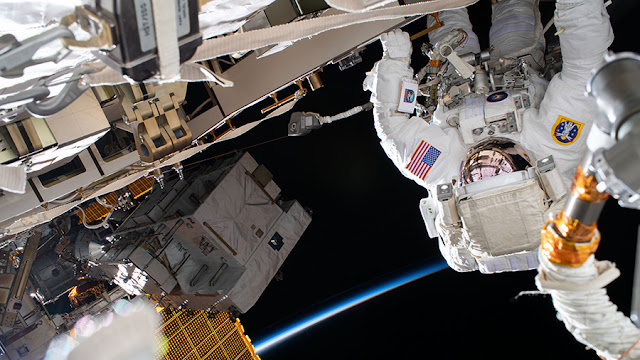ISS - Expedition 63 Mission patch.
July 17, 2020
It was 45 years ago today when American astronauts and Russian cosmonauts shook hands for the first time in Earth orbit. The Apollo crew ship commanded by NASA astronaut Tom Stafford docked to the Soyuz crew ship led by Alexei Leonov on July 17, 1975, signifying the beginning of international cooperation in space.
Apollo-Soyuz Test Project Crew's. Image Credit: NASA
Expedition 63 Commander Chris Cassidy and Flight Engineers Anatoly Ivanishin and Ivan Vagner commemorated the event today with a call from U.S. and Russian dignitaries. The Apollo-Soyuz Test Project would lay the groundwork for the Shuttle-Mir project and the International Space Station program.
Watch the event on YouTube: https://youtu.be/6LlKYN8H9gU
Cassidy later joined his NASA crewmates Bob Behnken and Doug Hurley to prepare for Tuesday’s spacewalk to wrap up battery swaps on the orbiting lab. Behnken and Cassidy will install the last lithium-ion battery on the station’s truss structure completing the 3.5 year-long power upgrade job. This follows Thursday’s six-hour spacewalk when the duo installed three lithium-ion batteries.
Image above: Astronaut Chris Cassidy works during a spacewalk on July 16 to install lithium-ion batteries on the station. The orbiting lab was flying into an orbital sunrise at the time this photograph was taken. Image Credit: NASA.
Before they go back inside the Quest airlock next week, the veteran spacewalkers will have one more job. The duo will get the Tranquility module ready for a new airlock built by NASA commercial partner NanoRacks. The airlock will enable public and private research on the outside of the station after its delivery on an upcoming SpaceX Dragon cargo mission.
International Space Station (ISS). Animation Credit: NASA
Meanwhile, critical space science to benefit humans on and off the Earth continues aboard the station. Ivanishin explored how microgravity impacts blood circulation and pain sensitivity. Vagner collected radiation measurements then studied how crews may pilot spaceships and robots on future space missions.
NASA Announces Crew Dragon Splashdown Date
Image above: NASA astronauts (from left) Bob Behnken and Doug Hurley, are pictured inside the orbiting lab shortly after arriving aboard the SpaceX Crew Dragon spacecraft on May 31. Image Credit: NASA.
NASA Administrator Jim Bridenstine today announced August 2 as the target splashdown date for DM-2 crew members Behnken and Hurley, with additional details on the return of this historic mission to come.
Related articles:
The Apollo-Soyuz Test Project: An Orbital Partnership Is Born
https://orbiterchspacenews.blogspot.com/2020/07/the-apollo-soyuz-test-project-orbital.html
NASA Astronauts Conclude Today’s Spacewalk
http://orbiterchspacenews.blogspot.com/2020/07/nasa-astronauts-conclude-todays.html
Related links:
Expedition 63: https://www.nasa.gov/mission_pages/station/expeditions/expedition63/index.html
Commercial Crew Program: https://www.nasa.gov/exploration/commercial/crew/index.html
Tranquility module: https://www.nasa.gov/mission_pages/station/structure/elements/tranquility/
Blood circulation: https://www.energia.ru/en/iss/researches/human/11.html
Pain sensitivity: https://www.energia.ru/en/iss/researches/human/17.html
Pilot spaceships and robots: https://www.energia.ru/en/iss/researches/human/24.html
Space Station Research and Technology: https://www.nasa.gov/mission_pages/station/research/overview.html
International Space Station (ISS): https://www.nasa.gov/mission_pages/station/main/index.html
Images (mentioned), Animation (mentioned), Text, Credits: NASA/Mark Garcia.
Best regards, Orbiter.ch





